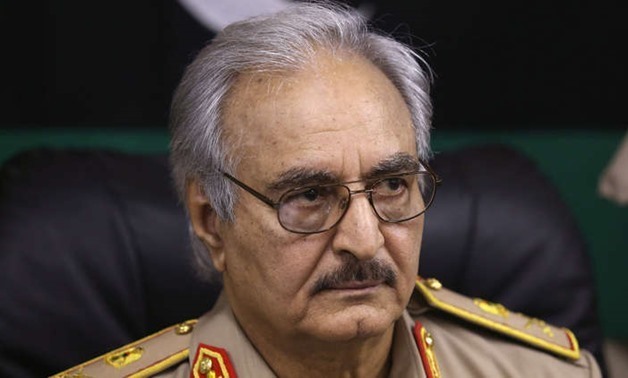
Field Marshal Khalifa Haftar, commander of the Libyan National Army / press photo
CAIRO – 26 June 2018: Libyan National Army (LNA) has succeeded to liberate the city of Derna entirely from terrorists after few weeks of fierce clashes, a high-profile military source revealed to Egypt Today Tuesday.
The source manifested the defeated terrorist groups had collapsed all over the city, adding that the military engineers cleared the city’s streets.
“LNA Commander Khalifa Haftar will deliver a speech within a few hours declaring the full liberation of Derna,” a Libyan official, asked for anonymity, exclusively told Egypt Today.
On June 6, Haftar, said that Derna will be declared terrorism-free soon. He called on soldiers to purge the city from terrorism, while keeping in consideration the safety of civilians.
In a televised speech, Haftar stressed that the army’s aim is to uproot terrorism, after terrorists had turned down all endeavors to avoid armed confrontation.
Haftar directed the army to take into consideration the safety of Derna’s residents and their properties, except for those who carry arms and fight against the Libyan people.
“After four years of holy struggle against the Kharijites, we are close to the liberation of Derna," Field Marshal Haftar said, warning his soldiers from terrorists’ ambushes.
Since the ouster of Libyan long-time leader Muammar Ghaddafi more than six years ago, the war-torn country draws wide international and regional attention, causing a serious threat on the national security of North Africa and Europe.
Libya, which is struggling to get through the critical political situation that it has been experiencing since 2011, is not only trying to unify its army, but is longing to revive its political functions by conducting presidential and legislative elections.
Egypt has hosted several meetings to bring the Libyan conflicted factions to the negotiations table to resolve the Libyan crisis and amend the Skhirat agreement, which aims at ending Libya’s civil war.
The major obstacle in the face of any international or Arab participation in ending the crisis in Libya is the lack of a Libyan partner that would support any involvement. Since 2014, there are two major factions on the ground, one led by Haftar, commander of the Libyan National Army, who now controls the eastern side of Libya and works in cooperation with the government of the House of Representatives, known as the Tobruk government. The other is led by Fayez al-Sarraj, head of the UN-backed Libyan Government of National Accord.
Therefore, there is no official side recognized by all parties in Libya, but there are two opposing factions, roughly equivalent in terms of power, competing for legitimacy. Nonetheless, neither side appears to be able to tip the scales of this conflict in its favor.

Comments
Leave a Comment